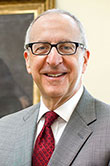END NOTE
MOOCs: A college education online?
Although it has given rise to jokes about cows and an outfielder for the 1986 New York Mets, MOOC is actually an acronym for Massive Open Online Courses. Depending on whom you ask, they point the way to the future of higher education, the end of higher education as we know it, both or neither.
Currently offered by several distinguished universities through consortia such as Coursera, edX or Udacity, MOOCs are free online college courses, designed by academic rock stars and "attended" by hundreds of thousands of students from around the world. Colleges rarely grant academic credit for MOOCs. The reward for completion is the satisfaction of acquiring new or necessary information and skills, and connections with students who share your interest.
By providing free access to anyone with an Internet connection, MOOCs facilitate the dissemination of knowledge to unprecedented numbers of people. Professors are learning a great deal from MOOCs. Armed with massive amounts of data about the "classroom" performance of students, they can adjust lectures, course material and examinations to improve comprehension, online and on campus.
MOOCs also have promotional value for colleges and universities. It's one thing to brag on a website about brilliant faculty. It's another when tens of thousands of people experience their brilliance firsthand, with the college's name attached.
The vast enrollments that provide these benefits also create problems. We have not yet figured out how to monitor exams to protect against cheating or plagiarism, how to answer students' questions, or how to identify and assist those who are struggling.
Successful MOOC participants are self-motivated but they are also rare: The completion rate for the first MOOC, a course on artificial intelligence offered by Stanford in 2011, was 13 percent.
Nor have universities crafted a viable business model for MOOCs. Udacity gets some revenue from corporations, including Google, for developing high-level, specialized courses. For a fee Coursera provides potential employers with the names of high-achieving students. Some of the money is returned to participating institutions, but, at present, it is insufficient to cover the costs of course development.
Those costs are considerable. A good MOOC employs blogs, online discussion boards, Twitter, tagging and document sharing (to say nothing of teaching assistants). Old-fashioned talking heads are delivered via video.

Cornell has offered a "mini-MOOC" on feeding infants and young children. Photo: Josh Webb See larger image
Dominated at the moment by courses in mathematics, computer science and engineering, MOOCs may be ill-equipped to teach students to write and express themselves or to provide the hands-on experience of working in a lab. Few are pitched at the introductory or remedial level that would provide economically disadvantaged or poorly prepared students a bridge to higher-level academic work.
Cornell, which expects to join a MOOC consortium soon, has already dipped an institutional toe in the water by offering a "mini-MOOC" on feeding infants and young children, developed by our Division of Nutritional Sciences and UNICEF. The results have been instructive. As of late February, more than 1,300 people from 113 countries, or 28 percent of registrants, had successfully completed the course. Eighty-seven percent of them rated it "excellent" or "very good."
What about the impact of MOOCs on traditional colleges and their on-campus students? We believe they have the potential to enhance pedagogy on our campuses. Professors may well assign MOOCs as homework, for example, and build on the information in them through in-depth discussions in the classroom. This has been referred to as "flipping the paradigm," so that the classroom is used for interaction, not passive absorption of the professor's insights.
We strongly believe, however, that MOOCs should not replace a residential undergraduate experience for young men and women able to afford it or who qualify for financial aid. The intellectual and developmental impact on students who live and learn together cannot be replicated by online classes. Susan Holmes, a professor of statistics at Stanford, put it well. "I don't think you can get a Stanford education online, just as I don't think that Facebook gives you a social life."
David Skorton is president of Cornell University; Glenn Altschuler is vice president for university relations, the Thomas and Dorothy Litwin Professor of American Studies, and dean of the School of Continuing Education and Summer Sessions. A longer version of this article originally appeared on Forbes' blog Jan. 28, 2013. Skorton and Altschuler co-author a monthly column on the blog.

